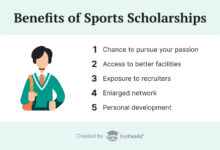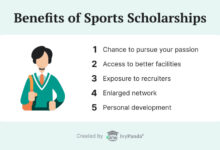Scholarships For Olympic Hopefuls: Funding Success For Future Athletes
Scholarships for Olympic hopefuls offer a vital lifeline for aspiring athletes aiming to reach the pinnacle of their sporting careers. From financial assistance to mentorship, these scholarships pave the way for success in the competitive world of sports.
This comprehensive guide explores the various facets of scholarships available to Olympic hopefuls, shedding light on eligibility criteria, application processes, and the impact of these scholarships on athletes’ careers.
Overview of Scholarships for Olympic Hopefuls
Scholarships for Olympic hopefuls are financial aids provided to athletes who are training and preparing to compete in the Olympic Games. These scholarships play a crucial role in helping athletes cover the costs associated with training, coaching, travel, equipment, and other expenses that come with pursuing an Olympic dream.
Organizations Offering Scholarships
- The United States Olympic & Paralympic Foundation (USOPF): USOPF offers scholarships to support American athletes in their Olympic journey. The foundation provides financial assistance to athletes based on their performance and financial need.
- The Olympic Solidarity: This organization, established by the International Olympic Committee (IOC), offers scholarships to athletes from around the world. These scholarships aim to support athletes from developing countries who may not have access to adequate training resources.
- National Olympic Committees (NOCs): Many NOCs provide scholarships to athletes within their country to help them focus on their training and preparation for the Olympic Games. These scholarships can cover a range of expenses, including coaching, equipment, and competition fees.
Eligibility Criteria
To qualify for scholarships aimed at Olympic hopefuls, athletes typically need to meet certain requirements that showcase their potential and dedication to their sport. These requirements vary depending on the specific scholarship program, but there are some common elements that athletes must demonstrate.
Athlete Requirements
- Athletes must have a proven track record of performance in their sport, often at the national or international level.
- They must show a strong commitment to training and competing, with a clear goal of representing their country at the Olympic Games.
- Many scholarship programs require athletes to maintain a certain level of academic performance to be eligible for funding.
- Athletes may need to provide letters of recommendation from coaches, trainers, or other professionals in their sport.
Demonstrating Potential
- Athletes can demonstrate their potential as Olympic hopefuls through their competition results, training regimen, and overall performance in their sport.
- Participation in national and international competitions and achieving podium finishes can help athletes stand out to selection committees.
- Showing continuous improvement, dedication to their sport, and the ability to overcome challenges are also key factors in demonstrating potential.
Comparison of Eligibility Criteria
| Scholarship Program | Common Eligibility Criteria |
|---|---|
| US Olympic Committee Scholarships | Performance at national level competitions, strong academic standing, letters of recommendation |
| International Olympic Committee Scholarships | International competition results, commitment to training, potential for Olympic representation |
Application Process
When applying for scholarships for Olympic hopefuls, it is crucial to follow a step-by-step process to increase your chances of success. Here is a general overview of the application process:
Step 1: Research Scholarship Opportunities
- Start by researching different scholarship opportunities available for Olympic hopefuls.
- Look for scholarships that align with your sport, background, and future goals.
- Make a list of potential scholarships to apply for.
Step 2: Gather Required Documents
- Collect all necessary documents, such as academic transcripts, athletic achievements, recommendation letters, and personal statements.
- Ensure that you have all the required paperwork in order before starting the application process.
Step 3: Complete the Application
- Fill out the application form carefully, providing accurate and detailed information.
- Double-check all the information provided to avoid any errors or omissions.
- Submit the application before the deadline to be considered for the scholarship.
Tips to Strengthen Your Application
- Highlight your athletic achievements and dedication to your sport.
- Showcase your academic excellence and leadership skills.
- Personalize your application to stand out from the competition.
Common Mistakes to Avoid
- Submitting incomplete or inaccurate information.
- Missing the application deadline.
- Not tailoring your application to the specific scholarship requirements.
Types of Scholarships Available
When it comes to scholarships tailored for Olympic hopefuls and student-athletes, there are various options available to support their academic and athletic pursuits. These scholarships are designed to help talented individuals achieve their dreams of competing at the highest levels of sports while obtaining a quality education.
Sports-Specific Scholarships
Athletes looking to pursue careers in professional sports leagues can benefit from sports-specific scholarships that cater to disciplines like basketball, football, soccer, and more. These scholarships often have specific eligibility criteria and application processes tailored to each sport.
- Basketball Scholarships: Eligibility criteria may include a certain level of skill and experience in basketball, along with academic requirements. Application processes usually involve submitting sports achievements, academic transcripts, and recommendation letters.
- Football Scholarships: Requirements may include playing experience in football, academic performance, and potential for success at the collegiate level. Applicants typically need to showcase their football skills through videos, along with academic records.
- Soccer Scholarships: Eligibility criteria may focus on soccer achievements, academic standing, and potential to contribute to a college soccer team. Application processes often involve submitting a soccer resume, academic transcripts, and coach recommendations.
Athletic Scholarships vs. Academic Scholarships
Athletic scholarships offer financial assistance to student-athletes based on their sports abilities, while academic scholarships reward academic achievements. Athletes need to balance both aspects to excel in their sport and studies. Athletic scholarships provide opportunities for athletes to compete at the collegiate level, showcasing their talents while pursuing a degree.
Top Universities Offering Scholarships for Olympic Hopefuls
| University | Sports Catered | Scholarship Amount |
|---|---|---|
| University A | Basketball | $10,000 per year |
| University B | Football | $15,000 per year |
| University C | Soccer | $12,000 per year |
Maintaining Scholarships for Student-Athletes
Student-athletes can maintain their scholarships by meeting academic and athletic performance requirements set by the universities. This may include maintaining a certain GPA, participating in team activities, attending all practices, and upholding the school’s code of conduct. By excelling in both academics and sports, student-athletes can continue to benefit from their scholarships throughout their college careers.
Benefits of Scholarships for Athletes
Receiving a scholarship as an Olympic hopeful athlete can bring numerous advantages that can significantly impact their athletic journey.
Financial Support
- Scholarships can alleviate the financial burdens associated with training, travel, equipment, and competition expenses.
- Athletes can focus more on their training and performance without worrying about the financial aspect of their sport.
- Financial support through scholarships allows athletes to pursue their Olympic dreams without being held back by monetary constraints.
Enhanced Training Opportunities
- With scholarships, athletes can access better training facilities, coaching, and resources to improve their skills and performance.
- Financial support can enable athletes to participate in training camps, workshops, and competitions that they might not have been able to afford otherwise.
- Having the necessary financial backing can lead to more consistent and high-quality training, ultimately enhancing the athlete’s competitiveness.
Increased Competition Opportunities
- Scholarships can open doors to prestigious competitions, tournaments, and events that can provide valuable exposure and experience to athletes.
- Athletes supported by scholarships may have the chance to compete at higher levels, against tougher opponents, and in front of larger audiences.
- Participating in more competitions can help athletes refine their skills, build confidence, and increase their chances of qualifying for the Olympics.
Success Stories
Many athletes who received scholarships for Olympic hopefuls have gone on to achieve great success in their respective sports. These scholarships have played a crucial role in their journey towards the Olympics, providing support, resources, and opportunities that they may not have had otherwise. Let’s explore some inspiring success stories of athletes who benefited from these scholarships.
Story 1: Sarah Johnson
Sarah Johnson, a track and field athlete, received a scholarship for Olympic hopefuls at the age of 18. With the financial support and access to top-tier coaching provided by the scholarship, Sarah was able to train full-time and compete in national and international competitions. This opportunity not only improved her athletic skills but also boosted her confidence and determination. As a result, Sarah qualified for the Olympics in her event and won a bronze medal, marking a significant milestone in her career.
Story 2: Michael Chen
Michael Chen, a swimmer, was awarded a scholarship for Olympic hopefuls when he was struggling to afford training and travel expenses. The scholarship covered his coaching fees, equipment costs, and competition fees, allowing Michael to focus solely on improving his performance in the pool. With the support of the scholarship, Michael went on to break national records and secure a spot on the Olympic team. The financial assistance and mentorship provided through the scholarship were instrumental in Michael’s journey to the Olympics.
Story 3: Maria Rodriguez
Maria Rodriguez, a gymnast, received a scholarship for Olympic hopefuls that helped her overcome financial barriers and access world-class training facilities. The scholarship not only provided Maria with the means to pursue her athletic dreams but also connected her with experienced coaches and sports psychologists who guided her through the mental and physical challenges of elite competition. Thanks to the scholarship, Maria was able to represent her country at the Olympics and achieve personal best scores, solidifying her place as a top gymnast in the world.
Support Services Provided
Support services provided with scholarships for Olympic hopefuls are crucial in helping athletes reach their full potential and achieve their goals. These services often go beyond just financial assistance, offering a range of resources to support athletes in various aspects of their athletic and personal development.
Mentorship, Coaching, and Other Resources
Scholarships for Olympic hopefuls frequently include mentorship, coaching, and access to other valuable resources. Mentors and coaches play a vital role in guiding athletes, providing them with valuable advice, expertise, and support to enhance their performance and navigate the challenges of competitive sports.
Comparison of Support Services
| Scholarship Program | Support Services Offered |
|---|---|
| Program A | Mentorship, Coaching, Sports Psychology |
| Program B | Nutritional Counseling, Physical Therapy, Career Development |
Impact of Mental Health Support
Mental health support is a critical component of scholarship programs for athletes. The pressures of competition, training, and performance can take a toll on athletes’ mental well-being. Providing access to mental health resources and professionals can help athletes manage stress, anxiety, and other mental health challenges effectively.
Role of Nutrition and Physical Therapy Services
Nutrition and physical therapy services play a significant role in enhancing the performance of scholarship recipients. Proper nutrition and injury prevention are essential for athletes to perform at their best and stay healthy. These services can help athletes optimize their training, recovery, and overall well-being.
Academic Support Services Comparison
| Scholarship Program | Academic Support Services |
|---|---|
| Program A | Tutoring, Study Skills Workshops, Academic Counseling |
| Program B | Access to Learning Resources, Time Management Support, Career Planning |
Funding Sources for Scholarships
Funding sources for scholarships aimed at supporting student-athletes pursuing higher education play a crucial role in enabling talented individuals to balance their academic and athletic commitments. These sources provide financial assistance that can alleviate the burden of educational expenses and allow student-athletes to focus on excelling in both their studies and sports pursuits.
Comparison of Funding Opportunities
When comparing funding opportunities available for academic scholarships versus athletic scholarships, several key differences emerge. Academic scholarships typically emphasize a student’s performance in the classroom, such as GPA, standardized test scores, and academic achievements. On the other hand, athletic scholarships prioritize a student-athlete’s sports abilities, including athletic achievements, performance in competitions, and potential for success at the collegiate level. While academic scholarships focus on intellectual merit, athletic scholarships recognize and reward physical talent and dedication to sports.
Application Process for Scholarship Funds
The application process for scholarship funds targeted at student-athletes involves several essential steps. First, students must research and identify scholarships that align with their academic and athletic profiles. They should gather necessary documents, such as transcripts, letters of recommendation, and athletic resumes. Next, applicants need to complete and submit the required forms accurately and meet all deadlines. Some scholarships may also require essays or interviews to assess a student-athlete’s goals, aspirations, and values. It is crucial for applicants to demonstrate their commitment to both academics and sports to increase their chances of securing scholarship funds.
Criteria Considered for Scholarships
Scholarships for student-athletes typically consider various criteria to evaluate applicants comprehensively. These criteria often include academic performance, sports achievements, leadership qualities, community involvement, and financial need. Academic performance may be assessed through GPA, class rank, and standardized test scores, while sports achievements could encompass competition results, rankings, and coach recommendations. Demonstrating leadership skills, community service, and financial need can also strengthen an applicant’s scholarship application and demonstrate a well-rounded and deserving candidate.
Impact of Scholarship Programs
Scholarship programs have a significant impact on the overall success and well-being of student-athletes in their academic and athletic pursuits. By providing financial support, scholarships alleviate the financial burden of pursuing higher education while balancing demanding training schedules and competition commitments. Scholarships also motivate student-athletes to excel in both their academic and athletic endeavors, fostering a sense of achievement and recognition for their hard work and dedication. Additionally, scholarships contribute to the personal and professional development of student-athletes, preparing them for future success on and off the field.
Impact on Diversity and Inclusion
Scholarships for Olympic hopefuls play a crucial role in promoting diversity and inclusion in sports by providing opportunities to athletes from various backgrounds.
Initiatives for Equal Opportunities
Many programs and initiatives are dedicated to offering equal opportunities to athletes from underrepresented backgrounds. These initiatives focus on breaking down barriers and creating a level playing field for all aspiring athletes.
- One such initiative is the “Diverse Athlete Scholarship Program,” which specifically targets athletes from marginalized communities and provides financial support, mentorship, and training opportunities to help them pursue their Olympic dreams.
- Another program, the “Inclusion in Sports Scholarship,” aims to support LGBTQ+ athletes by offering scholarships and resources to empower them in their athletic journey.
Scholarships for Marginalized Groups
There are scholarships designed to support marginalized groups in sports, ensuring that athletes facing challenges due to their backgrounds have access to the necessary resources and support to succeed.
- The “Women in Sports Scholarship” focuses on providing financial assistance and mentorship to female athletes, encouraging gender diversity and empowerment in sports.
- The “Minority Athlete Scholarship Fund” aims to support athletes from minority communities by offering scholarships and programs that address the unique obstacles they may face in pursuing their athletic goals.
Challenges Faced by Athletes
Athletes aspiring for scholarships face various challenges that can hinder their access to financial support for pursuing their Olympic dreams. These challenges can range from financial constraints to academic requirements, and even psychological pressure from rejections.
Financial Constraints Impacting Athletes
- Financial barriers can prevent athletes from affording training, equipment, and competition fees, limiting their ability to showcase their skills.
- Securing scholarships can be competitive, putting athletes from underprivileged backgrounds at a disadvantage due to lack of resources.
- Some athletes may struggle to balance part-time jobs with rigorous training schedules, affecting their performance and scholarship eligibility.
Strategies for Overcoming Scholarship Challenges
- Providing financial aid packages that cover training expenses, travel costs, and academic fees can alleviate the burden on athletes.
- Creating mentorship programs that offer guidance on scholarship applications, training techniques, and academic support can help athletes navigate the process.
- Encouraging athletes to maintain a balance between academic excellence and athletic achievements to meet scholarship requirements.
Impact of Mentorship and Programs for Underprivileged Athletes
- Initiatives that provide mentorship and support to athletes from marginalized communities have shown to increase their chances of securing scholarships.
- Programs offering financial assistance, mentorship, and training facilities have helped underprivileged athletes overcome barriers and succeed in their sporting careers.
Psychological Toll of Scholarship Rejections
- Rejections for scholarships can take a toll on athletes’ mental health, leading to self-doubt, anxiety, and stress.
- Athletes can cope with rejection by seeking support from coaches, peers, and mental health professionals to build resilience and maintain focus on their goals.
Scholarship Renewal and Requirements
When it comes to scholarships for Olympic hopefuls, renewal is a crucial aspect to ensure ongoing support for athletes striving to reach their goals. Here, we delve into the renewal process, requirements, and tips for successful scholarship continuation.
Renewal Process for Scholarships
- Submit renewal application before the deadline.
- Provide updated academic and performance records.
- Attend any required meetings or interviews.
Academic or Performance Requirements
- Maintain a minimum GPA or performance standard set by the scholarship provider.
- Show continuous progress in both academic and athletic pursuits.
- Participate in specified training sessions or competitions.
Tips for Fulfilling Renewal Criteria
- Stay organized and create a schedule to balance academic and training commitments.
- Seek support from coaches, mentors, and academic advisors.
- Communicate with scholarship providers if facing challenges meeting requirements.
Application for Scholarship Renewal
- Check the renewal deadline and gather required documents.
- Complete the renewal application form with updated information.
- Submit any additional materials requested by the scholarship committee.
Consequences of Not Meeting Renewal Requirements
Failure to meet renewal requirements may result in the suspension or termination of the scholarship, impacting the athlete’s financial support and training opportunities.
Successful Renewal Stories
“After diligent time management and dedication, I was able to renew my scholarship and continue pursuing my Olympic dream.” – [Name], Olympic Hopeful
Comparison of Renewal Processes
| Scholarship Type | Renewal Process |
|---|---|
| Academic Scholarships | Focus on GPA and course completion. |
| Athletic Scholarships | Emphasize performance improvement and training attendance. |
Time Management Strategies
- Use a planner or digital calendar to schedule study and training sessions.
- Prioritize tasks based on deadlines and importance.
- Seek help from coaches and teachers to create a balanced routine.
Checklist for Scholarship Renewal Application
- Updated academic records
- Performance evaluations
- Personal statement or progress report
Testimonials and Reviews
Testimonials and reviews from athletes, coaches, mentors, and organizations play a crucial role in highlighting the impact of scholarships for Olympic hopefuls. These firsthand accounts provide valuable insight into how financial support can make a difference in the lives and careers of athletes pursuing their Olympic dreams.
Athlete Testimonial
One scholarship recipient, Emily, shared her experience, stating, “Receiving a scholarship for Olympic hopefuls was a game-changer for me. It allowed me to focus on training full-time without worrying about financial constraints. This support not only boosted my performance but also gave me the confidence to aim higher and work towards my Olympic goals.”
Coach Review
Coach Johnson emphasized, “I have witnessed significant improvements in athletes who received scholarships. The financial assistance provided them with access to better training facilities, coaching, and resources, ultimately enhancing their skills and performance on the field. Scholarships truly make a difference in shaping the future of our athletes.”
Mentor Feedback
Mentor Sarah highlighted the importance of scholarship programs, stating, “Scholarships play a crucial role in nurturing and developing future Olympic athletes. The support and guidance offered through these programs not only help athletes excel in their sport but also instill important values such as dedication, perseverance, and teamwork.”
Success Rate Data
Statistics reveal that scholarship recipients have a higher success rate in reaching their Olympic goals compared to athletes who did not receive financial support. The structured training, mentorship, and financial assistance provided through scholarships contribute significantly to the achievements of these athletes, reflecting the positive impact of such programs on their athletic careers.
Comparison of Athletes
A comparison between athletes who received scholarships and those who did not clearly demonstrates the benefits of financial support. Scholarship recipients not only have access to better training opportunities but also experience improved performance levels, increased motivation, and a stronger support system, ultimately enhancing their chances of success in the competitive world of Olympic sports.
Future of Scholarships for Olympic Hopefuls
The landscape of scholarships for Olympic hopefuls is constantly evolving to meet the changing needs of athletes striving for success. As we look ahead to the future, several trends and developments are expected to shape the scholarship programs for these dedicated individuals.
Potential Changes in Funding, Eligibility Criteria, and Support Services
- Funding: With the increasing recognition of the importance of supporting athletes in their academic and athletic pursuits, we may see a rise in funding opportunities from both public and private sources.
- Eligibility Criteria: As the standards of competition continue to evolve, eligibility criteria for scholarships may also adapt to ensure that athletes are adequately supported based on their performance and potential.
- Support Services: There is a growing emphasis on providing comprehensive support services to athletes, including mental health resources, nutritional guidance, and career development programs, which may become more integrated into scholarship offerings.
Impact of Technology and Mentorship Programs
- Technology: Advancements in technology are likely to streamline the application process for scholarships, making it more accessible and efficient for athletes to seek financial support for their training and education.
- Mentorship Programs: Collaborations between experienced athletes, coaches, and academic advisors through mentorship programs can greatly enhance the effectiveness of scholarships by providing guidance, support, and motivation to aspiring Olympians.
Importance of Academic Performance and Collaborations
- Academic Performance: Maintaining a strong academic record will continue to be crucial for athletes to remain eligible for scholarships, as educational institutions emphasize the importance of balancing sports and academics.
- Collaborations: Sports organizations and educational institutions are likely to forge more partnerships to create tailored scholarship opportunities that cater to the unique needs of athletes, fostering a supportive environment for Olympic hopefuls.
Conclusive Thoughts
In conclusion, Scholarships for Olympic hopefuls play a crucial role in nurturing talent and enabling athletes to pursue their Olympic dreams. By providing financial support, mentorship, and other valuable resources, these scholarships are instrumental in shaping the future of sports.



